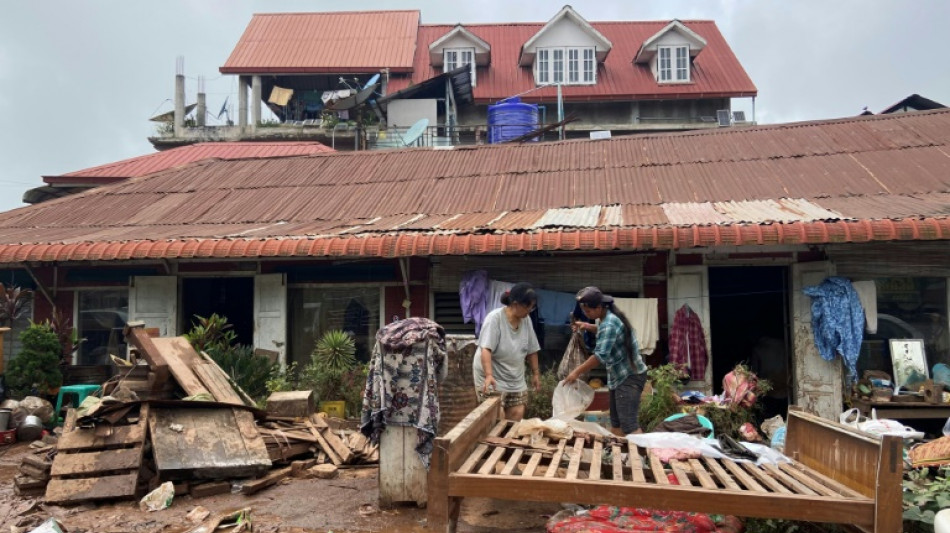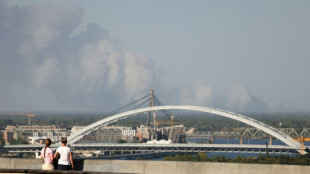
-
 Jaiswal slams majestic 161 but Australia fight back in Perth
Jaiswal slams majestic 161 but Australia fight back in Perth
-
Edinburgh's alternative tour guides show 'more real' side of city

-
 IPL teams set to splash the cash at 'mega-auction' in Saudi Arabia
IPL teams set to splash the cash at 'mega-auction' in Saudi Arabia
-
Olympics in India a 'dream' facing many hurdles

-
 Wounded Bangladesh protesters receive robotic helping hand
Wounded Bangladesh protesters receive robotic helping hand
-
Majestic Jaiswal 141 not out as India pile pain on Australia

-
 Giannis, Lillard lead Bucks over Hornets as Spurs beat Warriors
Giannis, Lillard lead Bucks over Hornets as Spurs beat Warriors
-
Juan Mata agent slammed as 'cowardly' by angry A-League coach

-
 Marta inspires Orlando Pride to NWSL title
Marta inspires Orlando Pride to NWSL title
-
Palestinian pottery sees revival in war-ravaged Gaza

-
 Main points of the $300 billion climate deal
Main points of the $300 billion climate deal
-
Robertson wants policy change for overseas-based All Blacks

-
 Israel retreat helps rescuers heal from October 7 attack
Israel retreat helps rescuers heal from October 7 attack
-
Afghan women turn to entrepreneurship under Taliban

-
 Mounting economic costs of India's killer smog
Mounting economic costs of India's killer smog
-
At climate talks, painstaking diplomacy and then anger

-
 Uruguayans head to polls with left hoping for comeback
Uruguayans head to polls with left hoping for comeback
-
Trump's mass deportation plan could end up hurting economic growth

-
 Iran director in exile says 'bittersweet' to rep Germany at Oscars
Iran director in exile says 'bittersweet' to rep Germany at Oscars
-
US consumers to bargain hunt in annual 'Black Friday' spree

-
 Cheers, angst as US nuclear plant Three Mile Island to reopen
Cheers, angst as US nuclear plant Three Mile Island to reopen
-
Scientists seek miracle pill to stop methane cow burps

-
 Australia ditches plans to fine tech giants for misinformation
Australia ditches plans to fine tech giants for misinformation
-
Developing nations slam 'paltry' $300 bn climate deal

-
 Red Bulls win 'Hudson River derby' to reach conference final
Red Bulls win 'Hudson River derby' to reach conference final
-
Neuville wins world title after Tanak crashes at Rally Japan

-
 Neuville wins world rally title after Tanak crashes in Japan
Neuville wins world rally title after Tanak crashes in Japan
-
Colapinto cleared for Las Vegas GP despite heavy crash

-
 'Smiling One' Amorim vows he has ruthless streak Man Utd need
'Smiling One' Amorim vows he has ruthless streak Man Utd need
-
Marseille down Lens to stay in touch with Ligue 1 leaders, Lyon draw

-
 New Zealand beat 'proud' Italy in Cane's Test farewell
New Zealand beat 'proud' Italy in Cane's Test farewell
-
Barca collapse in Celta draw without Yamal, Simeone hits milestone

-
 Thailand's Jeeno equals Yin for lead at LPGA Tour Championship
Thailand's Jeeno equals Yin for lead at LPGA Tour Championship
-
New Zealand beat Italy in Cane's Test farewell

-
 Marseille down Lens to stay in touch with Ligue 1 leaders, Lyon held to draw
Marseille down Lens to stay in touch with Ligue 1 leaders, Lyon held to draw
-
Liga leaders Barca suffer late collapse in Celta draw

-
 Retegui fires Atalanta top of Serie A ahead of Inter
Retegui fires Atalanta top of Serie A ahead of Inter
-
Greaves hits maiden Test century as West Indies dominate Bangladesh

-
 Venezuela opposition calls for mass anti-Maduro protest on Dec. 1
Venezuela opposition calls for mass anti-Maduro protest on Dec. 1
-
'Fragile' Man City in uncharted territory, admits Guardiola

-
 Erasmus hails Springbok strength in depth after thrashing Wales
Erasmus hails Springbok strength in depth after thrashing Wales
-
Postecoglou calls for consistent Spurs after Man City rout

-
 'We've never lived this situation' admits Guardiola
'We've never lived this situation' admits Guardiola
-
Lebanon says more than 55 killed in Israeli strikes

-
 'We've never lived this situation' admits Guardiola as Man City lose five in a row
'We've never lived this situation' admits Guardiola as Man City lose five in a row
-
Under-fire Gatland 'motivated' to continue as Wales coach

-
 South Africa send Wales crashing to 87-year low in Test rout
South Africa send Wales crashing to 87-year low in Test rout
-
Spurs condemn Man City to fifth straight defeat as Arsenal win

-
 Defeated Leipzig lose more ground on Bayern, Frankfurt go second
Defeated Leipzig lose more ground on Bayern, Frankfurt go second
-
South Africa put Wales to the sword to wrap up season


Supercharged storms: how climate change amplifies cyclones
From Hurricane Helene to Typhoon Yagi, powerful storms are battering the globe, and scientists warn that a warming planet is amplifying their destructive force to unprecedented levels.
Here's what the latest research reveals about how climate change is supercharging tropical cyclones -- the generic term for both weather phenomenon.
- Packing more punch -
First, the basics: warmer ocean surfaces release more water vapor, providing additional energy for storms, which intensifies their winds. A warming atmosphere also allows them to hold more water, boosting heavy rainfall.
"On average, the destructive potential of hurricanes has increased about 40 percent due to the 1 degrees Celsius (roughly 2 degrees Fahrenheit) warming that has already taken place," Michael Mann, a climatologist at University of Pennsylvania, told AFP.
In a recent paper in the Proceedings of the National Academy of Sciences (PNAS), Mann added his voice to calls for the Saffir-Simpson scale to be expanded to include a "new class of monster storms" -- Category 6, where sustained winds exceed 192 miles per hour (308 kph).
According to experts, climate change set the stage for Helene, which peaked as a Category 4 hurricane.
"The oceanic heat content was at a record level, providing plenty of fuel and potential for a storm like this to gain strength and become a large and very damaging storm," David Zierden, Florida's state climatologist, told AFP.
- Rapid intensification -
"Rapid intensification," defined as a hurricane speeding up by 30 knots within a 24-hour period, is also becoming more common.
"If intensification happens very close to the coast in the lead up to landfall, it can have a huge effect, which you saw last week in the case of Helene," Karthik Balaguru, a climate scientist at the Department of Energy’s Pacific Northwest National Laboratory, told AFP.
Balaguru was the lead author on a paper this year in journal Earth's Future that used decades of satellite data to show "a robust increase in the rates at which storms intensified close to the coast, and this is across the world."
The explanation is two-fold.
Warming climate patterns are reducing wind shear -- changes in wind speed and direction with height -- along both the Atlantic Coast of North America and the Pacific Coast of Asia.
"When you have strong wind shear, it tends to tear apart the core of the storm," explained Balaguru.
Climate change is also driving higher humidity along coastlines compared to the open ocean.
This is likely due to a thermal gradient created as land heats faster than water, causing changes in pressure and wind circulation that push moisture into the mid-troposphere where storms can access it. More data is needed to confirm this hypothesis.
Additionally, rising sea levels -- about a foot over the past century -- mean cyclones are now operating from a higher baseline, amplifying storm surges, said Zierden.
- How often? -
While the impact of climate change on how often cyclones happen is still an active area of research, studies suggest it can either increase or decrease frequency, depending on the region.
Particle pollution generated by industry, vehicles, and the energy sector blocks sunlight, partially offsetting the warming effects of greenhouse gases.
In a Science Advances paper, Hiroyuki Murakami, a physical scientist at the National Oceanic and Atmospheric Administration, found that particle emissions from the US and Europe peaked around 1980, and their decline leading to a rise in hurricane frequency in the Atlantic.
Conversely, in Asia, high pollution levels in China and India may be suppressing more frequent storm in the western Pacific, Murakami told AFP.
Another study he led found that human activity has increased tropical cyclone activity off Japan’s coast, raising the risk of rare precipitation events in the country's west through frontal rainbands—even when the storms themselves don’t make landfall.
This year's North Atlantic hurricane season was initially projected to be highly active. However, various meteorological factors created a lull from August through September, according to Zierden and Murakami.
Now, though "we've seen a dramatic ramp-up over the past week," said Mann. With hurricane season running until November 30, we're not in the clear yet, he stressed.
N.Fournier--BTB



